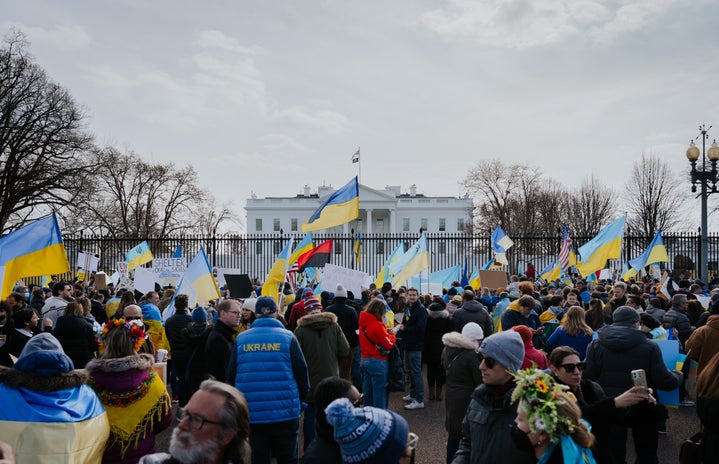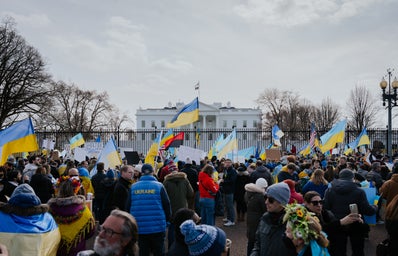About 3.5 million people have left Ukraine since the beginning of the Russian invasion, according to the UN Refugee Agency, UNHCR, on Tuesday, the 22nd of March. Besides Ukrainians, the group is made up of people of various nationalities, including Africans: black refugees and victims of racism in a war in which the armed forces choose, through skin color, who leaves the country.
Regarding the occurrences, UNHCR calls for governments to welcome all refugees, regardless of their country of origin. Unfortunately, getting to a safe place was far from the reality for many black refugees. Africans of different nationalities living in Ukraine were barred – or simply denied access – from transportation used to cross borders with other countries.
Many Ukrainian cities, it is worth noting, are home to thousands of Africans studying engineering, medicine, and military affairs. Jessica Orakpo is part of this group. The Nigerian medical student tells BBC News about the moment she was barred and the racism she suffered while trying to leave the troubled country. Her goal was to reach the border through the buses that “help” the refugees:
“I was begging. The guard looked me in the eye and said, ‘Ukrainians only.’ That if you were black, you should walk.”
Based on this and many other reports of racism, Africans and other black refugees living in Ukraine said they were being barred by guards or other Ukrainian citizens when trying to move to the borders, not even being able to get on buses and trains.
A Nigerian student tells, through his social media profile (Twitter), what it is like being black and trying to escape from Ukraine in the midst of war. He reports that at train stations in Kiev, the capital, children were given priority and that women would go second, then white men, and then the rest of the slots were taken by Africans. “We waited many hours for trains and couldn’t get on because of that.”
Brazilian, soccer player and black
Born in Juiz de Fora, the 18-year-old soccer player Guilherme Smith, who played in the Ukrainian team Zorya, had been trying to escape the war along with other Brazilians, among them: Juninho, from Cataguases (Minas Gerais) accompanied by his wife Vitória, with the couple’s only 4-year-old son and striker Cristian, coming from the Rio Grande do Sul city of Pelotas.
The group had already tried to cross the country towards Poland, they even walked 50km in the snow, but were stopped when they got close to the border. “We were denied by the Ukrainian military. I don’t know why. They didn’t want to look at our passports, they didn’t want to give us information. Very aggressive,” says Guilherme in an interview with journalist Juliana Dal Piva, from Uol.
The player also reports that he was slapped very hard on the chest by a policeman. Paralyzed, he didn’t understand why they did that to him, since he was only asking for information. This had never happened to him before. “At the time I didn’t know what to do because he had a rifle in his hand. I couldn’t say anything either,” he says.
According to Guilherme, the act of racism that occurred at the border was more than obvious, since white Ukrainian women and children could pass normally. But foreign men were barred, especially if they were Africans, Iranians, and Brazilians.
After several attempts, he managed to leave the country and reach Poland. “March 1st will be marked in our lives. We managed to cross over to Poland and, thank God, we are all fine. To our family: wait for us, we are coming,” wrote the player, on his social network profiles.
Guilherme Smith is already safe and on Brazilian ground. The information was confirmed by the player himself in his Instagram account: “What a special moment. Finally back with family, friends… very happy to see the people I love most!!!”
Ukrainian government response
On Wednesday, March 9th, Ukraine’s ambassador in the UK, Vadym Prystaiko, spoke out regarding the events and confirmed that black and Asian refugees have faced more difficulties than others in leaving the conflict-ridden country (invaded by Russia on February 24th).
Vadym is aware of the problem and at the same time denied the racist act by Ukrainians. According to the British newspaper The Independent, the ambassador said, “Ukraine is a very homogeneous society and there are not many people of different races on the streets. Foreigners stay out of the crowd, but that doesn’t mean they are racist.”
Therefore, the ambassador accepted a possible solution, which would be to take all these foreigners and refugees elsewhere in order to avoid conflict between them and the Ukrainians, who are also trying to leave the country.
The day before his speech, Dmytro Kuleba, Ukraine’s Foreign Affairs Minister, had an idea and managed to put it into practice: he opened a line intended to help ethnic minority students trying to leave the country. Like the ambassador, he acknowledged that there is different treatment with these people, but blamed the Russians for the situation. “The Russian invasion has affected Ukrainians and non-citizens in devastating ways.”
Racism in Ukraine
When it comes to the issue of race, it is to be expected that Ukraine does not have a good record. Among the military forces cooperating with the country is the Azov Battalion – a legalized white supremacist and neo-Nazi militia. Azov is currently fighting against the Russian government, but has been active within various sectors of society promoting ideas of Adolf Hitler and Stepan Bandera since 2014.
Bandera was the one who led us to understand a little better the racist dimension that Ukraine’s society gained in these last years. He fought against the Soviet Union being a nationalist leader of Ukraine. After the year 1941, he started collaborating with a group of Nazis, his intention was to establish a Ukrainian collaborationist state. It was clear that Bandera was anti-Semitic, anti-Communist, nationalist, and Nazi.
His image was brought back in the face of Ukrainian nationalist demonstrations. Finally, he is considered the mastermind of the Azov battalion and the Pravyy Sektor (Right Sector), a legalized neofacist and ultranationalist party that is part of the parliament in Kiev, the capital of Ukraine.


